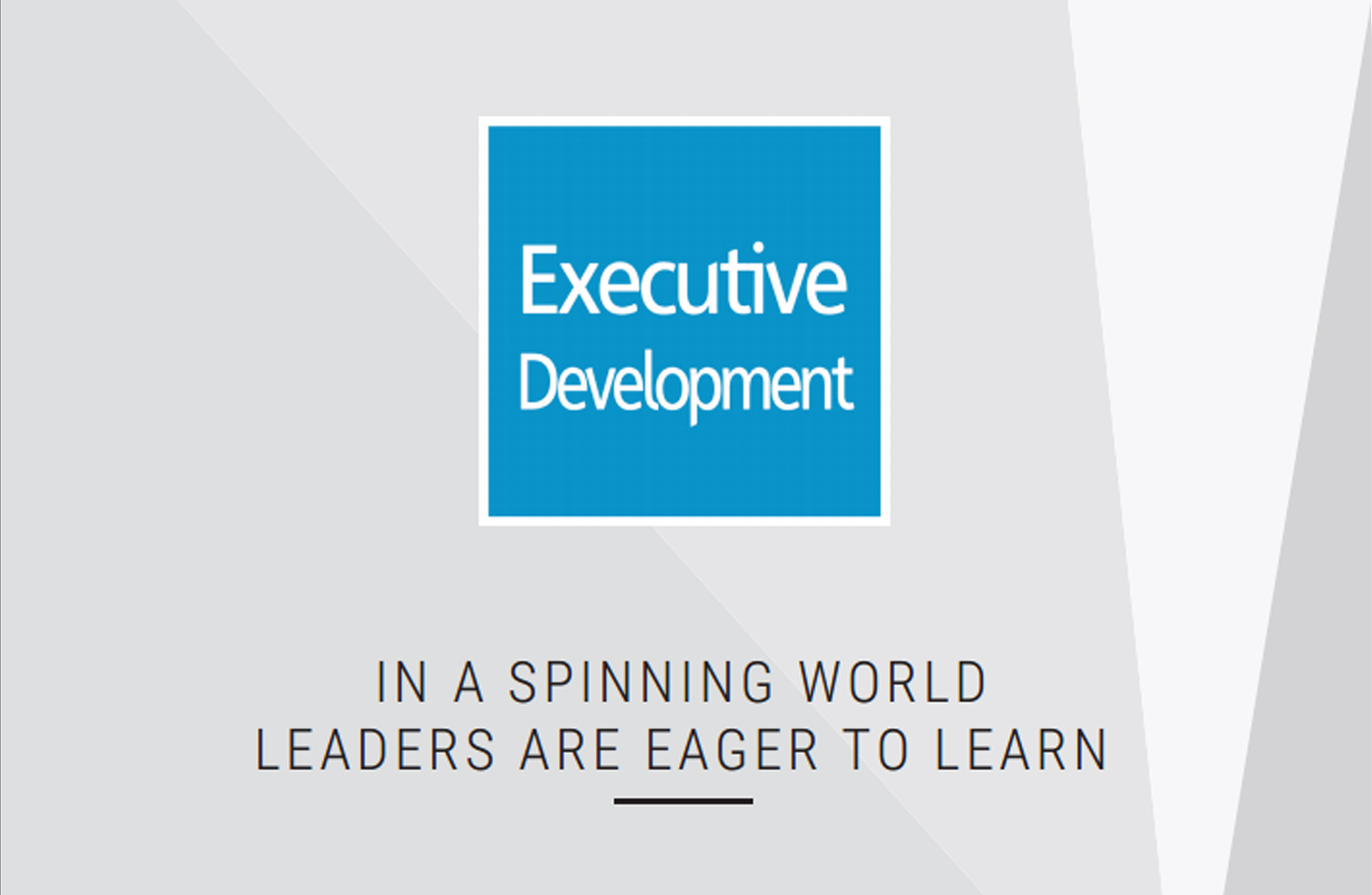The ALBA MBA
THE WORLD CHANGES. STAY AHEAD WITH THE ALBA MBA.OVERVIEW
Throughout its three decade-long history, the Alba MBA has been a groundbreaking innovator, helping early to mid-career professionals advance their career to upper-level management or create their own ventures. As the world changes, the program evolves in tandem to address the needs of modern businesses (and also in response to students’ feedback), building on the School’s core values. Striking a fine balance between academic excellence and business relevance, the program helps managers to function in a volatile business environment and transform into future leaders.
The Alba MBA makes a continuous effort to keep its ageless and business unusual promise: to foster an agile and flexible mindset and an ever-innovative philosophy. For the Alba MBA, business relevance is achieved in a three-fold manner:
- The program has incorporated Alba’s connections with the business community in its curriculum utilizing various forms of learning and using even more real-life cases.
- It has integrated the contributions of business personalities, practitioners and industry experts as thought leaders in a systematic and structured way across the program, setting the school as part of an overall learning ecosystem with impact on national and international level.
- The program is set up along the lines of a decision road map of a contemporary business executive. In this sense, we are not School/academic-centric but learner-centric.
- It offers continues support to the career development of Alba MBA students as well graduates
By joining the Alba MBA, you are entering the family of more than 2,000 ambitious individuals who have so far trusted the Alba MBA to fast-track their career and a powerful Alba alumni network (more than 60% hold senior positions) in more than 1,000 companies in 51 countries.
Stay ahead of the game with The Alba MBA !
Key features of the program
The Alba MBA has been set up to accommodate the needs of students who lead busy and demanding professional lives. Its basic features are:
- Evening Classes with easy access to the school: near metro stations; Weekday classes between 18:00 - 22:00 twice a week for the part-time mode (except May-June).
- Flexible schedule to accommodate the needs of professionals: 10-month program (20-month program for part-time mode).
- Wide range of courses that address the latest developments in Business: 20 courses in total, from 5 different thematic areas including 10 elective courses of specialization in all key areas of management
- A variety of assessments to enhance the analytical and practical skills of students: Group reports/presentations, real case study analysis, mini field consulting projects (FCPs) mid-term tests, final exams, online quizzes, peer evaluation reports, self-reflection papers.
- Capstone course offered by the Entrepreneurship Boot Camp (EBC) that provides a synthesis of all intended learning outcomes of the Alba MBA program in a single project that combines creativity innovation and implementation of new business ideas in an entrepreneurship/intrapreneurship setting.
Are you a professional with at least 3 years of solid work experience? The Alba MBA is the ideal program, if you:
- Wish to change you career path (industry or function) and are ready to take on a new challenge
- Plan to advance your career in management positions and manage people
- Are a scientist with no prior business background (e.g., engineer, doctor, researcher) and want to evolve into a business generalist and integrator or you entertain the idea of turning from a bricklayer into a business architect
- Are an entrepreneur and/or intrapreneur with a vision to take risks and create mindful business value, ready to capitalize on business opportunities
- You come from a family business and are about to take on new responsibilities or intend to grow your business.
You may find here more information about the Program's Intended Learning Outcomes.
Current Student Profile


A FUTUREPROOF LEARNING EXPERIENCE
Against a volatile global backdrop, the Alba MBA has reinvented itself to offer an upgraded and futureproof learning experience in the classroom and beyond, in order to shape resilient and agile leaders, who are well equipped to address any challenges at any time.
A real-word executive’s roadmap
Courses are modeled upon a problem-solving process (decision-making process) that executives follow in real life. Specifically, the curriculum is organized in distinct thematic areas that allow managers to assess their firm’s internal and external environment; identify challenges; address challenges by formulating and executing pertinent strategies; evaluate said strategies and provide feedback for further action to be taken in the future.
The main thematic axes around which the MBA learning process is built are:
- Awareness of the new reality: The student becomes aware of the new business environment which is characterized by platform economies, global business operations, digital transformation of business functions and sustainability.
- Looking at the numbers: This area offers a critical approach to financial reporting and analysis of financial implications of management decisions.
- Looking behind the numbers: The soft issues in business are examined in detail focusing in particular on the human factor and the organizations.
- Looking beyond numbers: Managers should look at the external environment, understand the markets they operate in, identify new ones and find ways to satisfy the needs of customers in sustainable and profitable ways.
- Solve problems and make decisions: MBA students learn through various methodologies to solve business problems. Through practical examples and case studies, managers learn not only what the “right solution” is but also learn from implementing the solution in real life conditions and understand the challenges that arise when applying theory in practice.
- Shape the future: Managers complete their learning journey with a future-forward outlook. The role of management is not limited to simply managing the present but also shaping the future of the business.
HIGHLIGHTS
The Alba MBA is a living experience that inspires students to act as leaders by offering them actionable knowledge and skills which they can apply directly to their current positions. In other words, they are encouraged to become true leaders and effective decision makers almost immediately. This is achieved through the following:
Balancing analysis with creativity | At Alba MBA the major question that drives are thoughts and actions is how can business leaders create financial and social value in an ever-increasingly paradoxical global environment. Balancing analysis with creativity is the answer and we are dedicated to helping you develop these two lifelong skills that employers want, societies appreciate and that you will definitely enjoy having. Entrepreneurial creativity, enabled by technical competency and leadership skills, is at the core of the Alba MBA.
A highly-accessible world-renowned faculty | You will be taught by resident and visiting faculty dedicated to business relevant research and teaching excellence. We boast Professors with top publications (such as Journal of Finance, Management Science, Academy of Management Review, Journal of Marketing), Academy of Management award winners, academic journal editors, and entrepreneurs. But what Alba MBA alumni appreciate the most is our Professors' accessibility, extroversion and open-door mindset.
International Recognition | Being accredited by AMBA (the Association of MBAs, the highest standard earned only by the top 3% of MBAs globally) and the prestigious US-based a New England Commission of Higher Education (NECHE), the Alba MBA has international credibility and status and enables access to networking opportunities to graduates of other accredited MBAs.
Unique, awarded, immersive modules | A unique feature of the Alba MBA is the inclusion of 5 multi-term courses (Entrepreneurship; Real life Consulting Projects, Management Acts: A Theatrical Integration; Leadership Development; Creativity and Innovation) which will help you nurture both analytical and creativity skills that employers and new business ventures require.
Intriguing learning methods | Professors use (short) lectures, role-plays, engaging case-based learning, strategic business simulations, games, real-life projects with companies, coaching, guest-speakers from the industry and their own research to provide relevant and challenging learning environments. Students will enrich their vitae with the most state-of-the-art business software and tools (e.g., SAP ERP software; Qualtrics, Marketing Engineering for Excel/Enginius; @Risk; Precision Trees).
A smooth and coherent learning experience |Another key advantage of the program is the instructors’ close collaboration to group courses into specific and thematic areas, thus ensuring the smooth progression of the learning process and guaranteeing a harmonious and flowing overall learning experience for the students.
Student engagement and networking with the business community | Thanks to Alba’s traditionally strong ties with the business community, the program embeds business experiences into the learning process in a structured and systematic way, to bring together students with SEV members, alumni, major banks, maritime industry representatives, and more. In addition, joint group projects with the collaboration of practitioners and industry experts enhance the relevance with up-to-date issues and developments that take place in key areas of business and management. A key feature of the Alba MBA, the projects also enable students to interact with each other, develop further their communication and learn by doing, function as members of a team and also lead teams. The physical engagement of students and interaction with the industry experts make for a priceless learning experience and an excellent opportunity for networking.
FULL TIME
The Alba MBA Program (Full Time) Total Year Schedule 2024 -2025
Total US Credits : 36
The school reserves the right to reexamine the structure of all academic programs and proceed to any necessary changes in the total year schedules.
You may find the Graduate Academic Calendar 2024–25 here.
1st Period | September - October
Environmental Social Governance & Ethics
2
The overall objective of the course is to help us develop business and financial ethics leadership praxis and actionable knowledge, i.e., action that creates wealth in such a way that makes ourselves, our organizations, and the world better. This course takes a management methods approach to business and financial ethics and social responsibility. The course focuses on methods managers can use individually and together in addressing ethics and social responsibility issues and in helping to build and maintain ethical and socially responsible organizations in various types of environments and realities. Methods considered include ethics leadership, change, reasoning, dialogue, persuasion, governance, due process, negotiating, incentive, training, social movement, alternative institution building, top-down and bottom-up compliance code and win-lose forcing methods, and ethics crisis management and turnaround methods. In addition to learning about the methods, students are invited to reflect upon what types of institutional citizens we would like to be and what types of ethical and socially responsible organizations we would like to help create in our various types of environments and realities. Case studies from Europe, Asia, and North America are considered.
Economics for Global and Digital Markets
2
This course concentrates on the economic fundamentals of management by developing tools and thinking frameworks to analyze the structure and the evolution of the industry and the macroeconomic environment of a company. The course employs classical economic as well as game theoretic methodology to study the operation of markets in allocating resources as well as the markets’ impact on managerial decision making. Topics under consideration include consumer and business behavior, their interaction in competitive and non-competitive markets, the impact of market structure in the company’s managerial decision making and strategies, and the economics of platforms. Furthermore, the course develops thinking frameworks and methods to help participants understand the macroeconomic environment within which businesses operate, and also to identify channels through which this environment influences their managerial decision making.
Quantitative Methods and Analytics
2
This course aims to enhance business problem modelling and solving skills by integrating concepts and frameworks from Statistics and Decision Science with modern Information Technology. Emphasis is placed on evaluating risks and using the theory of normative decision making to compare decision alternatives under uncertainty. Participants will learn how to structure complex management problems and combine quantitative analysis with judgment and critical thinking. Topics covered include forecasting, decision analysis, Monte-Carlo simulation and business optimization. It is a practical course that uses case studies and spreadsheets to illustrate how to apply the methodologies introduced.
Business Communication Skills
2
The purpose of this course is to build critical reading, writing and presentation skills to enable participants communicate effectively. After completing this course, its participants will be able to prepare different types of documents, searching and evaluating evidence adopting a critical approach in reading and writing. Moreover, this course provides students with the presentation skills to build presence, authority, and a newfound ability to captivate the audience. They will empower the content and their stage presence by discovering different presentation styles but most importantly identifying their own. A special feature of this course is that participants will have the opportunity to experience the tools presented through an interactive methodology.
Team Building
-
The aim of the workshop is to provide participants with a fulfilling and lively event, in order to introduce them to the importance of teamwork. By taking part in planned outdoor activities and exercises and through mutual support, the team enables itself to overcome difficulties and built strong bonds. Furthermore, this process will result into the formation of the groups that participants are going to work with during their studies.
2nd Period | November - December
Financial Reporting and Analysis
2
The course explores the ‘art’ of financial accounting / financial reporting. In particular, the goal of the course is to provide the knowledge and skills required for the understanding and use of financial accounting information for decision making. Some of the topics covered during the course include: the role and importance of financial reporting, the role of the main players in the accounting communication process, including the management, auditors and stakeholders, the effects of the use of different accounting methods and estimates on the financial statements and the subsequent impact on decision making, ways of analysing, interpreting and evaluating financial statements. During the course, extensive reference is made to the annual reports of various companies, as well as to accounting scandals (e.g. ENRON), for the facilitation of knowledge and understanding.
Managerial Finance
2
This course presents the major issues in financial management theory and practice. Students are presented with the major tasks of the financial manager, whose decisions contribute toward the accomplishment of the firm’s objectives. Particular emphasis is given in investment appraisal, valuation of corporate securities, managing the company’s resources, raising capital and coping with uncertainty. Topics covered by this course include portfolio theory, cost of debt and equity, valuation of bonds and stocks, capital budgeting and company valuation, exchange rates, and introduction in derivatives and their use by the firm. After the completion of this course the students will be able to determine the cost of capital for their firm, evaluate the expected benefits and risks of various investment decisions, learn how to evaluate capital expenditure proposals, understand the basic valuation models of corporate securities and learn how to use various derivative instruments to hedge the risk of the firm.
Leadership
2
Management consists of a set of universal skills that are well understood and trainable. Leadership consists of how each one of us makes a unique difference to the challenges we face with people and projects. It is not about wasting our energy trying to make ourselves more effective by changing our characters. Instead, it is more effective to find new and better ways of ‘being ourselves’ through enhanced insight and skill. The purpose of this course is twofold: (a) to assess and improve your readiness to function well as a leader by making your time at Alba Graduate Business School a self-directed journey of learning and development; the specific objectives are to develop an awareness of the knowledge and skills that underlie leadership effectiveness; to obtain individual-level feedback utilizing some of the best existing assessment instruments; to share feedback on your own and others’ skills; and to craft a personal leadership development action plan; (b) to help you acquire actionable knowledge about leadership styles, leading with power, and influence processes by exposing you to both classical perspectives on and contemporary trends in leadership theory and practice through a series of stimulating readings, discussions, exercises, and case studies.
3rd Period | January - February
Creativity & Innovation
2
Creativity and innovation are career and business imperatives in the fluid and highly competitive economy of the 21st century. The explosion of creative industries in recent decades have turned innovation into a critical success factor in any form of work that involves the imagination, aesthetics, emotion, invention, or/and problem solving. With the advent of the knowledge economy, creativity has also become a cardinal aspect of managerial jobs. Creative problem solving, creative responses to contextual variability, improvisation, and the ability to generate original and bold ideas are defining elements of career success. This course provides students with the knowledge, skills and insights for discovering and practicing creativity in organizations, groups, and one's own career. The fourfold structure of the course entails: (a) cutting-edge knowledge about such topics as developing creative capabilities, managing creative people, crafting creative work environments, and turning creative ideas into winning innovations; (b) concrete insight on practice through over 100 mini cases, examples and illustrations of creative accomplishment and innovation in business and society; (c) valuable "insider insight" about selected creative industries through direct interaction with guest speakers of notable creative achievement; and (d) practical application and the opportunity to act creatively during the course through brief interactive exercises and a major creative group assignment.
Marketing Engineering
2
Upon completing this course, students will be able to use automated spreadsheet software (Excel), in particular the marketing engineering platform “Enginius,” to craft marketing strategy based on marketing’s first principles and data analytics. Specifically, using several cases studies accompanied by marketing datasets and an integrated marketing strategy project where they will collect fresh, primary data using customer experience software (i.e., Qualtrics) students will learn, a) how to understand what customers value through segmentation analytics, b) how to create value for customers through conjoint analytics and, c) how to communicate value to customers through positioning analytics.
People & Organizations
2
The course provides an overview of the core areas of organizational theory and organizational behavior with a special emphasis on topics related to organizational structures, culture and values, employee motivation, teamwork, and the management of change in organizations. It will help participants understand the complex relations between individuals, organizations, and the external environment. Particular emphasis is placed on the effective functioning of organizations in dynamic environments, where strategic and operational agility have emerged as essential capabilities for organizations to survive and prosper. Through case studies, videos, discussion, and a simulation game, students will have the opportunity to exercise their critical thinking and develop management skills by applying related concepts and theories to a broad range of challenges relevant to the everyday life in organizations.
4th Period | March - April
Production & Operations Management
2
Production and Operations management can be defined broadly as the process steps that fulfil the production and delivery of “goods”, where “goods” include both material products and intangible services that offer some utility to the end consumer and the overall process subsumes all stages required to transform a product from a rough idea in a brainstorming meeting to the end customer offering. This course focuses on managerial decisions in production and operations and their interrelationships with the other functional areas of the firm. Major areas of study include the design of productive systems, strategic planning, and operations planning and control. Specific topics cover the areas of process and job design, facility planning, capacity planning, distribution planning, inventory management and production planning and control.
Business Integration
2
In teams, students will compete for profit and market share in a virtual muesli industry, over several business cycles. Students will manage raw materials, production, marketing, sales, accounting and competitive strategy. They will produce financial statements and other management reports that will help them improve their decisions and business performance over the following business cycles. In other words, during this simulation game, students will experience end-to-end management: from inbound logistics to sales, and from low level operations to executive decision making. The main objective of the course is to demonstrate how businesses can achieve integration and control via well defined processes and information systems. How seamless and reliable access to real time information provides end-to-end visibility to critical business operations and supports continuous improvement. Another objective of the course is to recapitulate all the core MBA subjects through an integrative and applied experience. This simulation game is an intensive, actionable and tremendously fun learning experience aimed at consolidating some critical skills of the MBA curriculum. The game is based on a special version of the SAP ERP software, developed at HEC Montreal and supported by SAP AG. During the course, the necessary training will be provided on the following modules: materials management, production planning, sales and distribution, financial accounting, cost accounting, and business intelligence.
Analysis of Business Problems
2
The latest technological developments have created unprecedented demand for people that can lead interdisciplinary teams. At the same time, managerial soft skills including critical thinking, comprehensive decision making, and creativity are becoming increasingly important, as many of today’s mundane and repetitive tasks will soon become obsolete. Analysis of Business Problems is more than anything a methodology course where students are exposed to a method for dealing with such unstructured problems. Using active learning methods—including business cases, workshops, and simulations— participants will be prepared to tackle complex and unstructured problems. Unstructured problems do not have a unique, correct solution, and are precisely where managers should thrive. Solving such unstructured problems is much of what managers do, and the ability to solve them is often what sets apart great managers from the pack. In this course, participants will be exposed to a method for dealing with unstructured problems that has been successfully used by the leading consulting companies, C-level executives, as well as top MBA graduates around the world.
Strategies for creating and sustaining competitive advantage
2
This course aims at honing students’ ability to analyze the organizational and external factors critical for crafting and implementing a firm’s strategy for competitive advantage. Two questions are of importance for gaining competitive advantage: “What business should we participate in” and “How should we compete?” In answering these questions, the external environment – competitors, partners, customers, and suppliers - and the internal environment – organizational purpose, structures, and resources & capabilities - take a central role in performing strategy diagnosis and analysis. We also examine strategic choices at the business unit and corporate level. Due to ever-changing business landscape, the course examines strategies through the lens of industry evolution (e.g., mature vs. innovation industries) and in different strategy contexts (e.g., ecosystems, technology-based industries). Throughout these contexts, we focus on exploring different sources of competitive advantage and aligning resources, activities, value proposition and organizational objectives. Through case studies and assignments, participants learn to use tools for analyzing, articulating, and, communicating strategies.
5th Period | May - June
Managing Business Challenges
2
The scope of the course is to help students develop competencies on how to analyze business challenges and design a plan to manage them. This new course consists of a series of lectures on consulting, analytical and decision models and also includes regular meetings, progress reports, and presentations. The course draws on knowledge students acquired from their studies at the MBA program, particularly from the course "Analysis of Business Problems”. At the completion of the course the teams will present their findings and recommendations to company representatives and members of faculty.
Period of Electives Courses (The equivalent of 2 full courses)
4
Entrepreneurship: The bootcamp experience
2
The Entrepreneurship bootcamp experience course has been designed to offer cutting-edge knowledge, hands-on experience and practical skills to MBA students who aspire to get a good grasp of the world of startups and plan new ventures. Students form teams and gradually develop unique business ideas in a highly interactive and practice-based learning journey. Within a period of two months students learn how to discover, assess, fund and pitch business ideas. In this process, students are exposed to novel frameworks and up-to-date learning tools (e.g., Business Model Canvas, Lean startup methodology, Minimum viable product, Financial feasibility testing, among others). The learning experience is designed by Alba resident faculty and curated by Alba academics and Venture Capital professionals, who coach, mentor and guide students throughout their learning journey. A panel of leading practitioners and academics evaluates presentations of business plans during the annual Alba Business Plan contest. The winning team represents Alba at i) the European Business Plan of the Year competition and ii) Stage Two, a pan-European start-up competition held under the patronage of EU-Commission.
PART TIME
The Alba MBA Program (Part Time) Total Year Schedule 2024 -2026
Total US Credits : 36
The school reserves the right to reexamine the structure of all academic programs and proceed to any necessary changes in the total year schedules.
You may find the Graduate Academic Calendar 2024–25 here.
1st Period | September – October
Quantitative Methods and Analytics
2
Business Communication Skills
2
Team Building
-
2nd Period | November – December
Financial Reporting and Analysis
2
Leadership
2
3rd Period | January – February
People & Organizations
2
Creativity & Innovation
2
4th Period | March – April
Production and Operations Management
2
Business Integration
2
5th Period | May – June
Period of Electives Courses (The equivalent of 2 full courses)
4
6th Period | September – October
Environmental Social Governance & Ethics
2
Economics for Global and Digital Markets
2
7th Period | November – December
Managerial Finance
2
8th Period | January – February
Marketing Engineering
2
9th Period | March – April
Analysis of Business Problems
2
Strategies for creating and sustaining competitive advantage
2
10th Period | May –June
Managing Business Challenges
2
Entrepreneurship: The bootcamp experience
2
FACULTY

Dr. Zarkos has teaching and research interests in the areas of Corporate Finance, Financial Management, Capital Budgeting, Real Options, Management Accounting and Strategy. His research focuses on new applications of real options in management decision making and the development of decision techniques in Corporate Finance and Strategy literature.
alba profile linkCAREER
Another important aspect of the Alba MBA is that the program itself does not operate in isolation as a closed system of business education, but as part of a wider learning ecosystem that develops on the network around Alba that connects students with academia, faculty, industry experts, companies, technology, communities, societies and global markets.
The Career and Alumni Office plays a major role in this: it offers tailored career consulting and networking solutions specifically to MBA students in order to assist them in their personal development and career advancement. The Office makes a point of offering MBA students stimuli that address their needs and wants, such as bringing alumni in the classroom in various ways, so that they become a vital part of students’ life experience during and after their studies at Alba.
Our vision for our graduates
- Subject experts capable of managing a company end-to-end namely from human capital management to operations and financials.
- Entrepreneurs and intrapreneurs that will lead new business formation functioning in a high performance team context.
- Creative teamplayers with the skills and stimuli for discovering and practicing creativity in organizations, groups and their own personal pursuits.
- Mindful business leaders with confidence, authenticity, civility and practical wisdom (phronesis).
SCHOLARSHIPS
You can secure pre-approval of your scholarship, before you apply for admission to the MBA or MSc program of your choice.
GMAT Scholarships
Scholarships of 40% for MBAs and MSc programs for GMAT ≥ 645
Next Generation Family Business Scholarship
One (1) merit-based partial awarded to a member of the next generation of a family business for several MBA & MSc programs
Leventis Foundation Scholarships
Full and partial scholarships for Nigerian nationals for the Alba MBA & MSc in Finance
SEV (Hellenic Federation of Enterprises) Scholarships
Partial scholarships of 50% to Small and Medium Enterprises – members of SEV, offered as rewarding services to the members of the Federation.
Women on Top partial Scholarship
Women on Top offers one partial merit- based scholarship.
ADMISSION REQUIREMENTS
To be considered for admission, candidates must:
- Hold a bachelor’s degree; - Provide evidence of excellent command of the English language;
- Have a minimum of three years substantial work experience (military service not included);
- Need to be currently employed or self-employed (valid for the part time mode only) GMAT tests are optional unless the Academic Committee requires the applicant to take them: in any case, scores of 515 or more (GRE >155) can strengthen your application and help you secure a scholarship.
Candidates must submit:
- The completed application form, including one recent photograph in jpeg format;
- Two letters of recommendation in Greek or in English language.
- Official Academic Transcripts as well as Certified copies of degrees from each undergraduate, graduate or professional degree earned;
- Proof of competence in the English language (unless schooled in English): Proficiency (Cambridge Proficiency, Michigan Proficiency, MSU Proficiency), or TOEFL, or IELTS, or Duolingo English Test;
- Three Essays, as indicated in the Application form;
- Receipt of the non-refundable application fee's [€60] deposit
Click here to download the details for admission.
For details on academic policy, course credit policy, fees policy, and rules for student conduct, please refer to the Student Handbook
Additionally, the School's Students Code of Conduct can be found here
REQUEST A BROCHURE
Fill in this form for a copy of the brochure
CONTACT

We urge applicants to request further information or to come for a meeting at our downtown campus, in order to better understand their profile and motivations.
Just fill out and submit the form below and we will respond to you as quickly as possible.
Tel.: +30 210 89.64.531 ext. 2269
e-mail: [email protected]
























